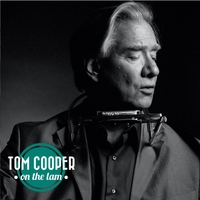MEET Tom Cooper: Tom Cooper grew up listening to the blues men of the early 1900s, Big Bill Broonzy, Sun House, Leadbelly and Robert Johnson. From the early 1960s, Tom listened to Bob Dylan and Dave Van Ronk . He started playing blues harmonica in junior high and has sung the blues ever since. In addition to playing music, Tom is an avid songwriter. Music has always been his passion, yet there was a time when changes in his life challenged that passion. It took a tremendously moving personal event to ignite a fire in Tom Cooper to bring him back to music. Fans of his music are glad to see him come home.
WMI: What does music mean to you?
TC: Everything! It is the most poignant and humorous way for me to express myself. I love how good it feels to let my feelings out, the blues, you know?!
WMI: How old were you when you decided to go after a music career, and what inspired you to focus on music?
TC: When I was five or six years old, I would listen to country and pop music on a portable radio and sing along with the artists. I think I knew then that my career would be music. My mother, my grandmother and most of her side of the family played piano, so my grandmother bought us a Baldwin upright. My mother had my sister and brother and I take piano lessons, which I hated and thought “un cool”, so I talked my parents into giving me an acoustic guitar for Christmas when I was 14; that’s when I wrote my first song.
WMI: Were those early days of trying to make a go of it as a musician as rewarding and as challenging as you thought they would be? How so?
TC: Yes, those earlier days were definitely a challenge. The 1970’s were a gauntlet for any musician who had the nerve to pursue music as a career. Of course, it was also intensely rewarding when one would accomplish something, like when I was interviewed and sang original songs for two hours on a radio show. I was broke, but I thought I had really “made it”!
WMI: What type of work did you do to pay the bills even as you continued to pursue a music career?
VD: I read an interview given by the late actor Charlton Heston when I was in college. In the interview, he talked about how he would model in art schools while he was a struggling actor. I walked a similar path for about 10 years, singing in restaurants and college clubs.
WMI: How in the world were you able to stay motivated as a musician during the years you realized music alone wasn’t going to pay the bills?
TC: I worked in fast food, factories and hospitals, but like a famous blues musician once said, “If you’re a musician who really loves your craft then you will play whether you are paid or not.” I got out of the business just before I got married and went corporate for many years, but I have always loved playing music no matter what the circumstances.
WMI: Which works better for you, focusing fully on your career as an artist or focusing on your career, in part, as an artist and, in part, as a businessman?
TC: I focus fully on being an artist, but I love business and it’s been fun to merge the two. With six years of art school topped off with a business degree, I formed a record company after my wife died a few years ago. I hire from three to five people who freelance for me in different capacities, continuing to delegate more and more tasks to them. I love everyone who freelances with me and plan on bringing them into the company full-time!
WMI: Tell us about one to two of your most memorable live performances.
TC: As I touched on in response to an earlier question, I performed and was interviewed on the radio not long after I got out of college. It was a profound experience! Ironically, I was so broke that I did not have a stereo system, so I had to go to a friend’s place to listen to the interview! As of late, there are many memorable performing experiences. When fans are having a good time and someone in the audience gives me a thumb’s up or wants to talk to me about a song, it makes my evening.
WMI: What was the process of creating the “All Over You, All Over Me” video like?
TC: I met a beautiful woman from Singapore at a music convention in LA last February; she was very supportive of the music business. We spent most of the day together, so I wrote the song about her. In this case, the lyrics and the melody came to me simultaneously; I knew I had to do it on the piano right away. We did the video in a beautiful, pre-civil war house in Richmond, VA, called the Bolling Haxall House. My photographer/videographer, Ashleigh Hobson and her fiancé, Patrick, recorded all four of the videos there. I had never done a video on location before; it was definitely more work than doing it in a studio.
WMI: What advice would you give to a musician who’s in his or her teens or early 20s, advice that could help the musician realize career success as early as possible?
TC: Of course, the best thing for an artist in any genre is to grow up in a family that loves and supports art, so you would have one or more mentors at your convenience who can teach you. If not, then I would encourage a musician to get a mentor who knows the music business. It would be a big help.
WMI: What has been the most rewarding part of working as a musician?
TC: Whether I have played music professionally or not, it has always been a wonderful way for me to express my feelings.
WMI: Social media networks, press releases, interviews, etc. provide a myriad of marketing opportunities. Share three to four specific marketing strategies/action steps you have found to be most effective at getting you exposure for your music.
TC: I hired two young artists, Courtney Mannion and Ashleigh Hobson, who graduated from VCU and a good friend of mine, Violaine Philippe Walker, who has a “special events” background. They have been a tremendous help in teaching me how to use social media networks. That said, a good website with links to Facebook, Twitter and YouTube are a good way to start. It is a good idea not to cut corners on your website. It is definitely to your benefit to put out a high quality CD. If you have a CD, then you have access to on line radio stations.
WMI: In what ways do you see the Internet changing the music industry over the coming two to three years?
TC: All recorded music has become totally accessible to the listeners of the world and I love that it has made advertising so cheap. I think that on-line radio and TV stations are just going to keep multiplying, giving artists of all genres more and more outlets for their creativity.
WMI: Tell us about your latest CD. Is there a specific message you want listeners to take away from the work?
TC: It is called Exit Music, titled after a song I wrote about a dear friend of mine. When I was a kid, I hated piano lessons, but I have gone back to the piano over the last year.
I love listening to the piano work of early Laura Nyro, an artist who wrote for The Fifth Dimension. I also love listening to the work of Joni Mitchell, who is well known.
On my latest CD, eight songs are on the piano and four on the 12 string guitar with blues harmonica interspersed throughout. There are nine original songs and three cover songs with the message of love throughout, hopefully move people to a better place, perhaps make them more introspective.
WMI: Who inspired you to go after your dreams when you were a child? How is this person still positively impacting your life today?
TC: One of my cousins was a professional musician; she performed at our house for my family when I was a kid. After that I was hooked! I didn’t know what a mentor was at the time, so I never approached her about mentoring me. She was really popular on the East Coast in the 1960’s so I was actually afraid to perform for her, finally I sent her my first CD last year and she really loved it. We keep in touch and she has imparted a great deal of knowledge about the music business to me ever since.
WMI: What’s next for Tom Cooper? Where do you see yourself and your music career three to five years from now?
TC: Performing globally on a concert level and also doing commercial, TV and movie spots to increase revenue so I can bring my team on board full-time. Eventually, I would love to sign some new acts under my Window’s Edge label.





Pingback: Tom Cooper's musical passions run deep, infuse ...